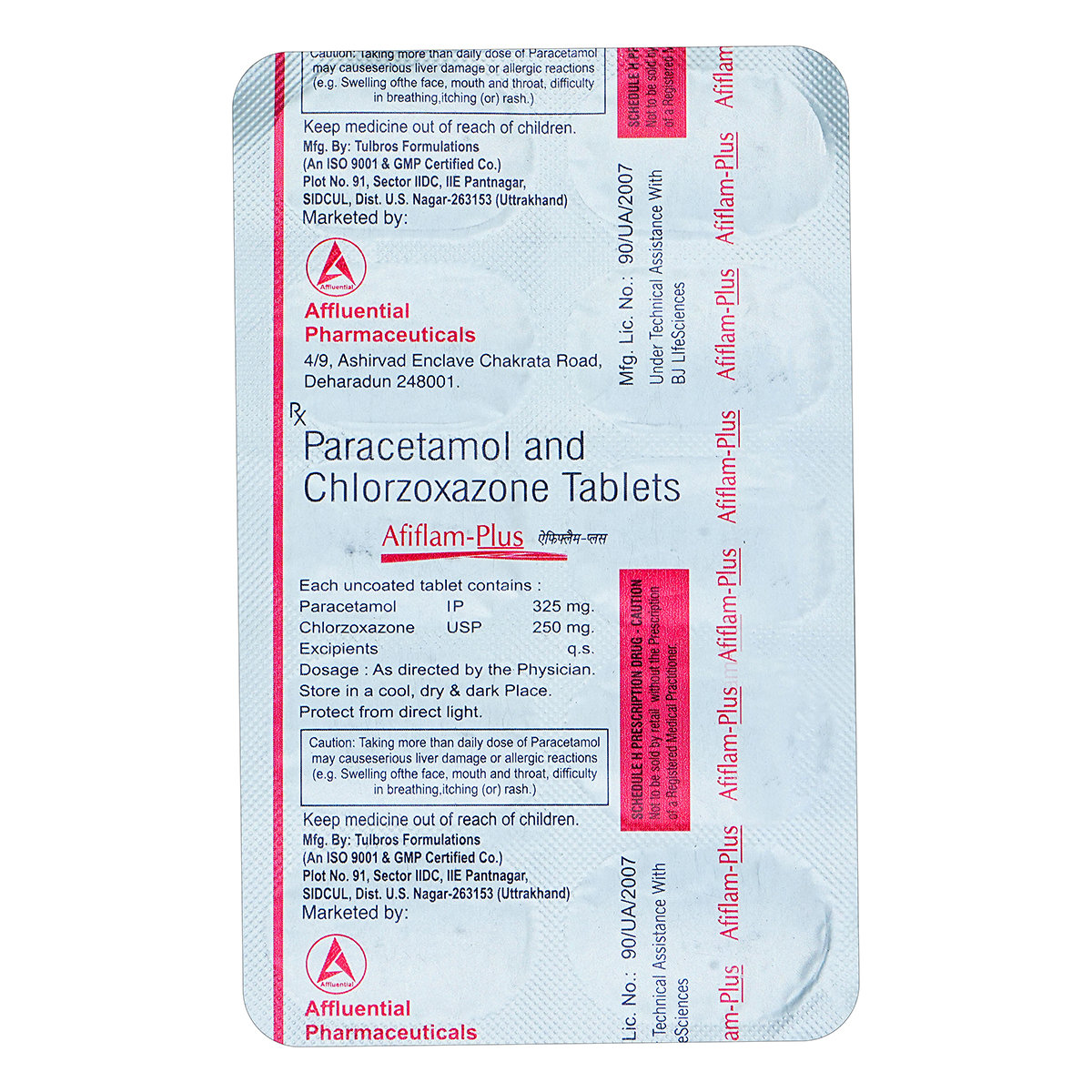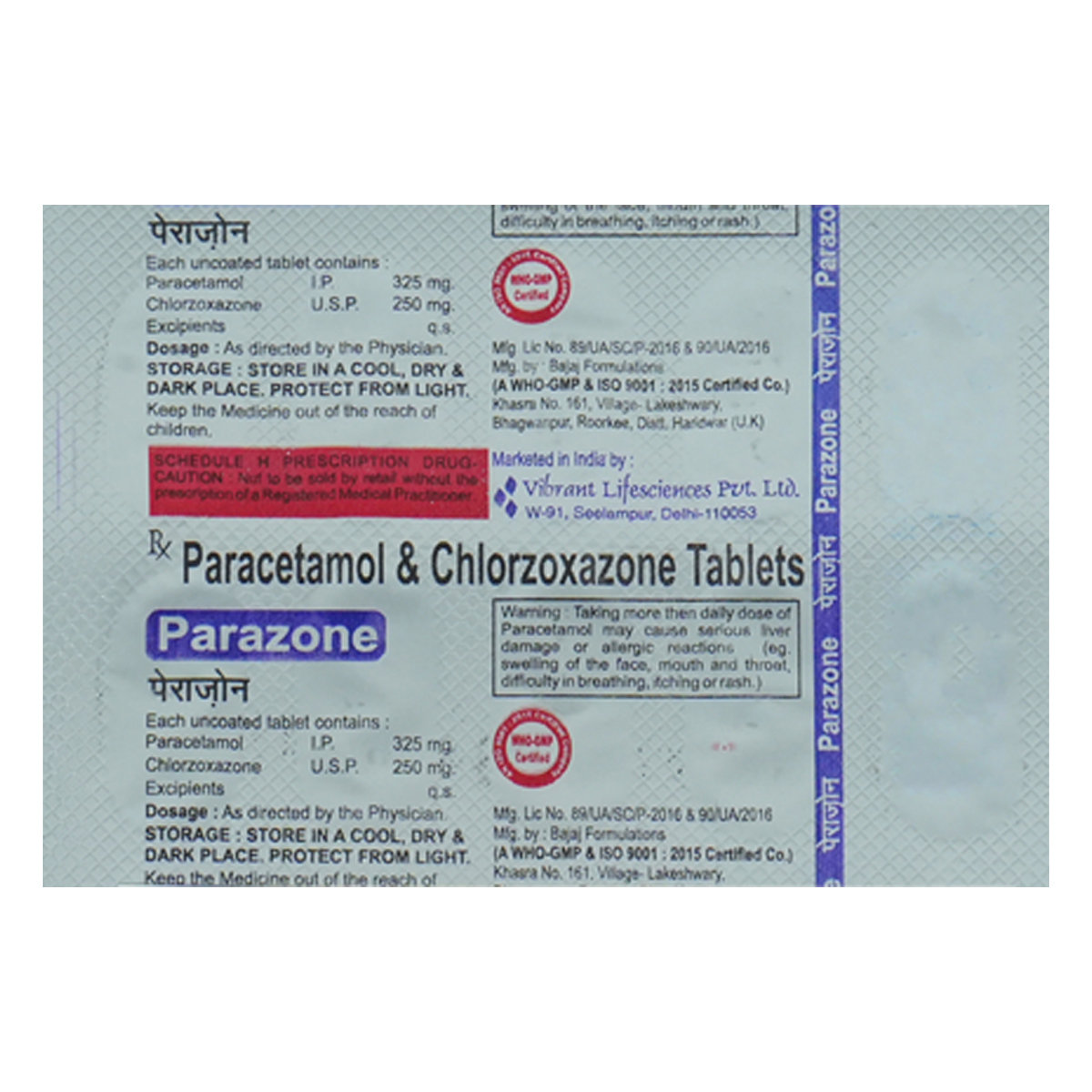Chlorzoxazone+paracetamol
About Chlorzoxazone+paracetamol
Chlorzoxazone+paracetamol belongs to the class of drugs known as analgesics and muscle relaxants. It is primarily indicated for the relief of severe skeletal muscle spasms associated with painful conditions such as low back pain, sprain, strain, myalgia (muscle pain), headache, traumatic muscle injuries, cervical root and disc syndrome, torticollis (neck muscle contractions), and fibrositis (pain and inflammation of muscles). Muscle spasms are involuntary contractions of muscle which can be painful.
Chlorzoxazone+paracetamol is a combination of two drugs: Paracetamol (Analgesic) and Chlorzoxazone (Muscle relaxant). Paracetamol works by inhibiting the synthesis of prostaglandins which are responsible for pain and inflammation. Chlorzoxazone acts on the brain and spinal cord centres where it inhibits multisynaptic reflex involved in muscle spasms, thereby providing relief from skeletal muscle spasms. Together, Chlorzoxazone+paracetamol helps in relieving musculoskeletal pain.
You are advised to take Chlorzoxazone+paracetamol for as long as your doctor has prescribed it for you, depending on your medical condition. In some cases, you may experience certain common side-effects such as gastrointestinal disturbances, nausea, dizziness, drowsiness, weakness, and light-headedness. Most of these side-effects do not require medical attention and will resolve gradually over time. However, you are advised to talk to your doctor if you experience these side-effects persistently.
Chlorzoxazone+paracetamol contains paracetamol, do not take any other medicines containing paracetamol along with Chlorzoxazone+paracetamol unless prescribed. Consult your doctor if you are pregnant or breastfeeding. Chlorzoxazone+paracetamol is not recommended for children as safety has not been established. Avoid consuming alcohol along with Chlorzoxazone+paracetamol as it could increase the risk of stomach bleeding. Chlorzoxazone+paracetamol may cause drowsiness and dizziness, so drive only if you are alert. Keep your doctor informed about your health condition and medicines to rule out any side-effects/interactions.
Uses of Chlorzoxazone+paracetamol
Medicinal Benefits
Chlorzoxazone+paracetamol is a combination of two drugs, namely: Paracetamol and Chlorzoxazone. Chlorzoxazone+paracetamol is used to relieve pain and stiffness caused by muscle strains and sprains. Chlorzoxazone+paracetamol is indicated for the relief of severe skeletal muscle spasms associated with painful conditions such as low back pain, sprains, strains, myalgia (muscle pain), headache, traumatic muscle injuries, cervical root and disc syndrome, torticollis (neck muscle contractions), and fibrositis (pain and inflammation of muscles). Paracetamol is an analgesic that inhibits prostaglandin synthesis, responsible for pain and inflammation. Chlorzoxazone is a muscle relaxant that acts on the brain and spinal cord centres, where it inhibits the multisynaptic reflex involved in muscle spasms, thereby providing relief from skeletal muscle spasms. Together, Chlorzoxazone+paracetamol helps in relieving pain due to muscle spasms.
Directions for Use
Storage
Side Effects of Chlorzoxazone+paracetamol
- Gastrointestinal disturbances
- Nausea
- Dizziness
- Drowsiness
- Weakness
- Light-headedness
Drug Warnings
Do not take Chlorzoxazone+paracetamol if you are allergic to any of its contents. Chlorzoxazone+paracetamol contains paracetamol, do not take any other products containing paracetamol along with Chlorzoxazone+paracetamol. Inform your doctor before taking Chlorzoxazone+paracetamol if you have heart, kidney or liver impairment. Consult your doctor if you are pregnant or breastfeeding. Chlorzoxazone+paracetamol is not recommended for children as safety and efficacy have not been established. Avoid consuming alcohol along with Chlorzoxazone+paracetamol as it may cause increased dizziness and can also increase the risk of stomach bleeding. Chlorzoxazone+paracetamol may cause drowsiness and dizziness, so drive only if you are alert. Stop taking Chlorzoxazone+paracetamol and consult your doctor immediately if you have stomach pain or any signs of bleeding in the intestine or stomach, such as blood in stools. Do not take any other NSAIDs for pain relief along with Chlorzoxazone+paracetamol unless prescribed.
Drug Interactions
Drug-Drug Interactions: Chlorzoxazone+paracetamol may interact with antacids (ranitidine), hypnotics (zolpidem), anti-depressant (duloxetine, escitalopram), antihistamines (diphenhydramine, cetirizine), anti-convulsant (pregabalin, topiramate), anti-hypertensive (metoprolol), pain killers (hydrocodone), anti-anxiety (alprazolam), opioid pain or cough relievers (codeine, hydrocodone), other muscle relaxants (carisoprodol, cyclobenzaprine).
Drug-Food Interactions: No interactions found/established.
Drug-Disease Interactions: Inform your doctor if you have heart, kidney or liver dysfunction.
Drug-Drug Interactions Checker List:
Safety Advice

Alcohol
unsafeAvoid consumption of alcohol while taking Chlorzoxazone+paracetamol as it may cause increased dizziness.

Pregnancy
cautionPlease consult your doctor if you are pregnant. Your doctor will prescribe only if the benefits outweigh the risks.

Breast Feeding
cautionPlease consult your doctor if you are breastfeeding, your doctor will decide whether Chlorzoxazone+paracetamol can be taken by breastfeeding mothers or not.

Driving
cautionChlorzoxazone+paracetamol may cause drowsiness and dizziness. Do not drive or operate machinery unless you are alert.

Liver
unsafeChlorzoxazone+paracetamol is not recommended in patients with liver impairment. Please consult your doctor if you have a liver impairment or any concerns regarding this.

Kidney
cautionDose adjustment may be needed in patients with kidney impairment. Please consult your doctor if you have kidney impairment or any concerns regarding this.

Children
unsafeChlorzoxazone+paracetamol should not be given to children as safety and effectiveness were not established.
Habit Forming
Diet & Lifestyle Advise
- Physical activity helps strengthen muscles and relieves joint stiffness. Gentle activities like 20-30minutes of walking or swimming would be helpful.
- Performing yoga may also help in improving joint flexibility and pain management.
- Maintain a healthy weight by performing regular low-strain exercises and eating healthy food.
- Get adequate sleep, as resting the muscles can help reduce inflammation and swelling.
- De-stress yourself by meditating, reading books, taking a warm bubble bath or listening to soothing music.
- Acupuncture, massage and physical therapy may also be helpful.
- Eat food rich in antioxidants such as berries, spinach, kidney beans, dark chocolate, etc.
- Foods containing flavonoids help in reducing inflammation. These include soy, berries, broccoli, grapes and green tea.
- Avoid smoking and alcohol consumption.
Special Advise
- Chlorzoxazone+paracetamol may rarely cause your urine to turn orange or reddish-purple. This effect is harmless and will disappear when the medication is stopped.
- Regular monitoring of liver function in patients with liver impairment is advised.
Patients Concern
Disease/Condition Glossary
Musculoskeletal pain: Musculoskeletal pain affects the bones, muscles, ligaments, tendons, and nerves. It can be acute or chronic and can be localised or widespread. The pain can be mild or severe enough to interfere with your daily routine. Musculoskeletal pain could occur due to arthritis, osteoporosis, fractures, dislocations, problems with the bone structure or injury to the bones, joints, tendons, muscles, and ligaments. Symptoms of musculoskeletal pain include stiffness, swelling, redness, weakness, muscle spasms or twitching, trouble moving the affected area, soreness, and cracking or popping sounds at the joints.
FAQs
Chlorzoxazone+paracetamol contains Paracetamol and Chlorzoxazone. Paracetamol works by inhibiting the synthesis of prostaglandins responsible for pain and inflammation. Chlorzoxazone acts on the brain and spinal cord centres, where it inhibits the multisynaptic reflex involved in muscle spasms, thereby providing relief from skeletal muscle spasms. Together, Chlorzoxazone+paracetamol helps in relieving musculoskeletal pain.
Take Chlorzoxazone+paracetamol as prescribed by the doctor. Do not take more than 3-4 tablets in 24 hours. Maintain a minimum gap of 6 hours between each dose of Chlorzoxazone+paracetamol. Do not overdose, as it could lead to unpleasant side-effects.
Chlorzoxazone+paracetamol is generally prescribed for short-term use. Avoid taking Chlorzoxazone+paracetamol for longer durations unless prescribed by the doctor, as it could lead to unpleasant side-effects.
Chlorzoxazone+paracetamol contains paracetamol, an antipyretic agent that reduces body temperature to normal by acting on the hypothalamic heat-regulating centre, thereby helping relieve fever. However, Chlorzoxazone+paracetamol is a combination of two drugs: Paracetamol and chlorzoxazone, which is used to relieve pain due to muscle spasms. It is not advisable to take Chlorzoxazone+paracetamol for fever.
Do not take Chlorzoxazone+paracetamol along with other pain killer medicines unless prescribed by the doctor, as it can lead to unpleasant side-effects and can increase the risk of stomach bleeding associated with NSAIDs.
Proper rest and physical therapy are recommended to enhance and complement treatment with Chlorzoxazone+paracetamol.







